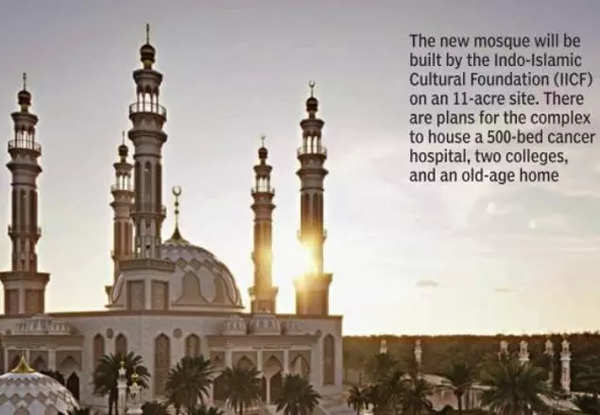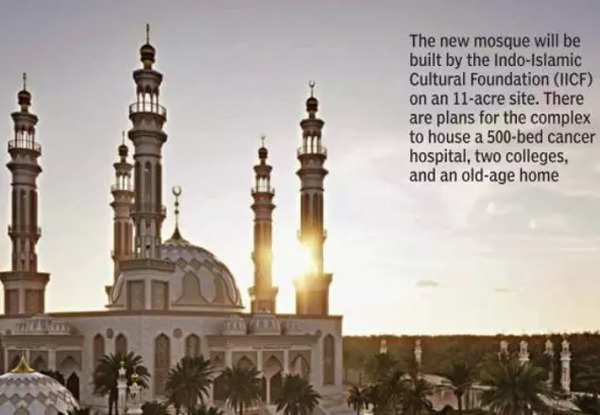
[ad_1]
The idea is to make the 11-acre site at Dhannipur village a multicultural place of ‘dawa’ (medicine) and ‘dua’ (prayer). They got 5 acres from the government and Sunni Waqf Board added an adjoining 6-acre plot. Now, a 500-bed cancer hospital, two colleges, an old-age home and an all-vegetarian kitchen, besides the grand mosque set amid gardens and fountains, are on the cards.
Haji Arfat Shaikh, newly appointed chairperson of the mosque development committee, wants it to be a place that people of all religions would want to visit. “The all-veg kitchen, hospital, colleges are all conscious decisions. People of all faiths will get food here… nobody will return hungry. This will also be a place of modern education and medicine – all free or highly subsidised,” he said.
Of And By The People
Shaikh, a BJP leader from Mumbai and former chairperson of Maharashtra Minority Commission, said IICF will raise funds for the mosque, which will “outshine the Taj in grandeur”. They plan to start a QR code-based crowdfunding operation this month. “We don’t want people to stand on the streets and ask for donations… every Indian will be able to contribute… There will be complete transparency as to how and where the money is spent,” he said.
Donors will also be able to dedicate a brick each for the mosque’s construction.
“Each brick will be assigned a number and donors will be informed where in the mosque their brick has been placed,” said Shaikh, adding the cost for this has not been decided yet.

Marble Mosque, Giant Quran
The mosque will have five minarets representing the five central tenets of Islam – Kalima, Namaz, Roza, Zakat and Hajj. Its prayer hall will have space for 9,000 people at a time, making it possibly the second biggest in India after Delhi’s Jama Masjid that can accommodate 25,000.
One of the mosque’s talking points is a 21×36-feet Quran bound in saffron – a colour associated with Khwaja Muinuddin Chishti of Ajmer and known as ‘chishtiya’ among Muslims.
“If you recall, the shawl and pagdi of Garib Nawaz (Chishti) are chishtiya,” Shaikh pointed out.
The architectural designs that Shaikh shared show an all-white marble mosque but he said, “other stones will be used too. The design is undergoing tweaks as we speak because some of the stakeholders demanded changes”.
Regardless, he said, the mosque will be a sight to behold. “It will be more beautiful than Taj.” And he wants people of all faiths to visit. A large aquarium is planned for sightseers, and the fountains will spring to life with the call for the day’s last namaz. “There will be a space for people to pray for all those innocents who were killed during the clashes when the Babri Masjid was demolished,” he added.
As for the colleges, Shaikh said they will admit students from all faiths and backgrounds. While they have not decided on lower cutoffs for Muslims, he said, “We want to encourage Muslims students, especially girls, to pursue higher education.”
Not Taking Chances Now
Although the government itself allotted land for the mosque in Dhannipur, the mosque committee wants to be doubly sure it’s not walking into a dispute. “Before we start construction, we would like the state government to give us a certificate stating the land title is clear. We would not want a repeat of Babri here,” Shaikh said.
The project design is getting final touches, and the proposal to the UP government for approvals is also almost ready. “We will open our construction office at the site in February this year and start construction after Ramzan in May,” he said.
It Could Be Ready By 2030
The mosque’s first brick will be laid in a grand ceremony. Shaikh said a large brick with the mosque’s name and a ‘dua’ etched on it will be brought to Dhannipur in a procession after being blessed at mosques across the country.
“A descendant of Sufi saint Sarkar Peer Adil, whose tomb is in Bijapur, is expected to carry the first brick for the foundation from Mumbai . We will all go to Ayodhya by train. The brick will be worshipped at each station,” said Shaikh.
Construction could last five to six years, and the trust will invite the Imam from Mecca to lead the first namaz at the mosque. Asked if he believes the mosque could bring people of all faiths together, Shaikh said that is the commitment he and the IICF have made to themselves. “I hope we are able to heal old wounds and move towards a brighter future.”
[ad_2]
Source link